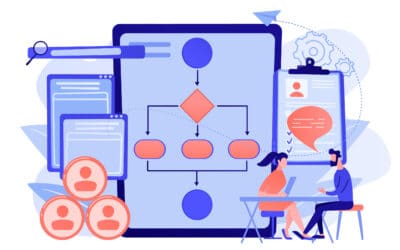The employee experience has shifted and with it, employee expectations. With the current competitive labor market and looming recession, employers must adjust their strategy to combat the labor challenges and retain indispensable employees. For multi-unit leaders, it will be especially difficult to navigate the challenges ahead as companies continue to juggle rising costs, interest rates, and supply chain shortages. Outsourcing operations like Finance and Accounting or HR can help companies meet employee expectations. Here’s how:
Are you prepared for a recession? Read our blog: How Outsourcing Can Help Prepare You for a Recession.
1. Outsourcing Is Familiar with Remote and Hybrid Work
The shutdown launched companies into a new world of remote work, and it has become an expectation. Increased flexibility is a must, but it can be hard to sustain. Many franchise owners don’t have the right tools in place to make remote or hybrid work as efficient and productive as it could be, nor do they have the data security in place to keep their employees, customers, and business information secure. Not to mention that engaging employees and staying connected are difficult with a remote workforce.
Outsourcing providers have been practicing remote work for years. Clear and effective communication and streamlined and efficient processes from a team of experts working outside of your organization have been mastered by most outsourcing providers. These companies have the tools in place, the experience to make it work, and have invested in data security, taking much of the load off their clients.
2. With Outsourcing, There’s No Shortage of Talent
Finding employees to fill roles is already difficult, but finding employees with critical skills can seem impossible. Experts in Accounting, tax, benefits, payroll or data reporting are hard to find and highly competed for in the labor market. With an outsourcing provider, your operations are taken care of by a highly skilled team. Companies don’t have to worry about finding and filling those positions, because their outsourcing provider already has the team and knowledge in place. This frees up your HR leader’s time to focus on your customer-facing employees.
3. Outsourcing Relieves the Workload for Overwhelmed Employees
Companies are learning that to create a workforce with stellar performance and an intent to stay, they need be paying attention to their employees’ mental health and well-being. We’re looking at employees more personally, and valuing the trends that make or break an employee’s job performance and loyalty to their company. Many companies have or are planning to invest in well-being benefits. However, a recession could quickly undo their progress.
Typically, a recession brings layoffs, and layoffs leave behind a mountain of work for the remaining employees. Additionally, it can take leadership’s focus off of its people as teams scramble to strategize and survive. With an outsourcing provider, companies can scale their services as needed without layoffs in those areas. With an outsourcing provider handling the everyday operational tasks, leaders and teams can then focus on helping their employees navigate the recession, adjust schedules as needed, and provide support while continuing to drive business goals and take care of customers
4. Outsourcing Reduces Turnover Costs
The labor shortage will continue and turnover will increase. With an outsourcing provider, you eliminate turnover on your core operations team. Not only does it take the pressure off of your HR team and allow them to focus on customer-facing staff, but it can significantly decrease the high cost of turnover and staffing those positions in general. Between rising interest rates and the cost of goods, companies will need to look for ways to eliminate unnecessary overhead.
Bottom Line
It’s becoming increasingly more difficult for multi-unit companies to compete in the labor market as employee expectations change. If leaders want to become a preferred employer, they’ll have to meet those expectations and really focus their efforts on their recruiting and retention strategy. This means letting go of some of those other operational processes like Finance and Accounting, HR, or Benefits Administration to free up resources and realize significant cost savings.





0 Comments